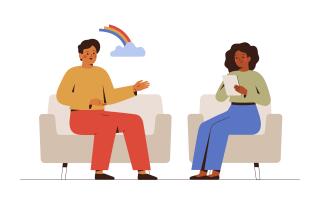High Life / A WEEKLY FORUM FOR HIGH SCHOOL STUDENTS : Embarrassment Is Normal Part of Growing Up, Doctor Says
- Share via
If you ask your parents to drop you off a few blocks away from a friend’s house, tell them not to worry. Your embarrassment over parents is a necessary part of growing up, says Dr. Laurence Steinberg, a professor of psychology at Temple University in Philadelphia and co-author of the book “You and Your Adolescent.”
A major chore of adolescence is achieving independence from Mom and Dad. Because being seen in public with parents implies dependence and immaturity, even a simple family outing can cause humiliation. Such hypersensitivity seems illogical to parents, but the feeling is very real to teen-agers and can be very painful.
The psychologist advises that parents take steps to minimize their child’s normal embarrassment. Whenever possible, for example, older children should bring a friend to family outings. At the movies, teen-agers can buy their own tickets and sit a bit apart from the rest of the family to boost independence. In restaurants, older children should order for themselves and deal with the waiter or waitress on their own.
“Such experiences allow them to feel grown-up while still being part of the family,” Steinberg says. “Being unsympathetic just provokes more sullenness and an even greater negative reaction.”
Embarrassment is a sign of normal, healthy development in younger children as well, says Dr. Jan Drucker, a professor of psychology at Sarah Lawrence College in Bronxville, N.Y. “By the age of 2 or 3, children become embarrassed when scolded,” she says. “It helps them form a sense of right and wrong and to develop a social conscience.”
Between the ages of 6 and 10, Drucker says, children begin to worry not only about how they appear, but also how their family appears to others. These feelings of embarrassment grow much more frequent and intense by adolescence.
The good news: Embarrassment over parents doesn’t last forever, Drucker says. “Age brings a greater sense of individual identity and the realization that we are ultimately judged on our own merits, not our parents’.”
“We’ll do all right if we can capitalize on our mistakes.”
--Mickey Rivers, former
major league baseball player





